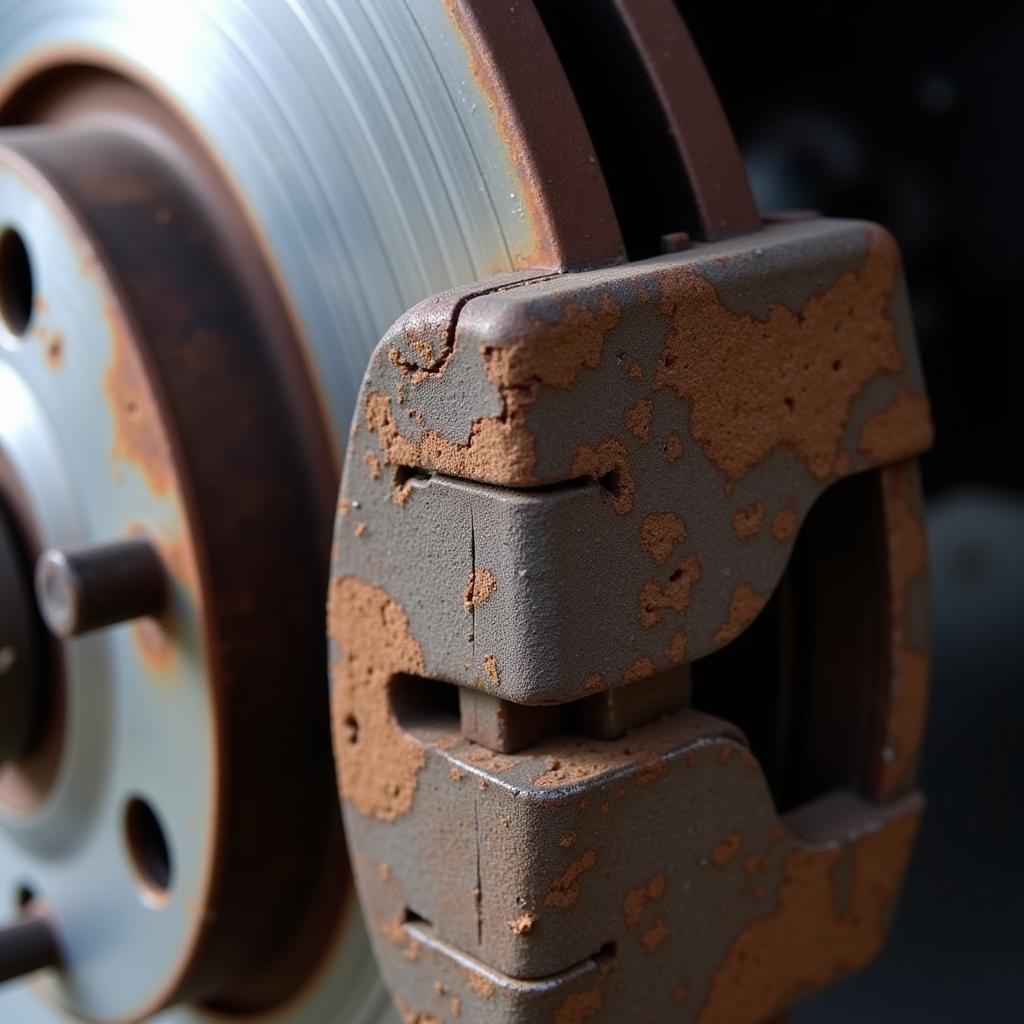That irritating screeching or grinding sound emanating from your brakes? That’s the brake pad warning sound, a clear signal that your brake pads are nearing the end of their lifespan. Ignoring this auditory alarm can lead to costly repairs and compromise your safety. This article will delve into the causes, diagnosis, and solutions for dealing with the brake pad warning sound. brake pad wear warning sound
Understanding the Brake Pad Warning Sound
The brake pad warning sound is a deliberate design feature incorporated into most modern braking systems. A small metal indicator, often called a “squealer,” is attached to the brake pad. As the friction material wears down, this indicator comes into contact with the brake rotor, producing the characteristic high-pitched squeal. This sound is your car’s way of telling you it’s time for new brake pads.
 Brake Pad Wear Indicator
Brake Pad Wear Indicator
What does the brake pad warning sound mean?
Simply put, the brake pad warning sound signifies worn brake pads. It’s a crucial safety feature that alerts drivers before the pads wear down completely, preventing metal-on-metal contact which can damage the rotors.
Why is my car making a grinding noise when braking?
A grinding noise while braking is a more serious issue, indicating that your brake pads have worn down completely. The metal backing plate is now grinding against the rotor, causing damage and significantly reducing braking efficiency. Immediate action is required to prevent further damage and ensure your safety.
Diagnosing the Brake Pad Warning Sound
While the squealing sound is usually indicative of worn brake pads, there can be other culprits. It’s essential to accurately diagnose the problem to avoid unnecessary repairs.
How can I tell if my brake pads need replacing?
Besides the warning sound, other signs include reduced braking responsiveness, a vibrating brake pedal, or a pulling sensation when braking. Visually inspecting the brake pads through the wheel spokes can also reveal their thickness.
Can other issues cause a similar sound?
Yes. Sometimes, debris trapped between the brake pad and rotor, or rust buildup on the rotors, can cause a similar squealing sound. Extreme temperatures or moisture can also contribute to unusual brake noises.
Fixing the Brake Pad Warning Sound
Addressing the brake pad warning sound promptly is crucial for maintaining safe and efficient braking performance.
How do I fix the brake pad warning sound?
The primary solution is to replace the worn brake pads. This is a relatively straightforward procedure for most vehicles, although it can vary depending on the make and model.
Can I replace my brake pads myself?
While replacing brake pads is possible for DIY enthusiasts with the proper tools and experience, it’s a safety-critical component. If you’re unsure, it’s always best to consult a qualified mechanic.
Brake Pad Warning Sound Prevention
Preventing the brake pad warning sound boils down to regular brake maintenance.
How can I prevent premature brake pad wear?
Avoiding aggressive driving habits, such as hard braking and rapid acceleration, can significantly extend the life of your brake pads. Regular brake inspections are also crucial for identifying potential issues early on. brake warning light audi a4 2007
“Regular brake inspections are crucial, not just for addressing warning sounds, but also for preventing potential problems before they escalate,” advises John Smith, a certified automotive technician with over 20 years of experience. “A small investment in preventive maintenance can save you significant costs and hassle down the road.”
Conclusion
The brake pad warning sound is a critical safety feature, alerting drivers to the need for brake pad replacement. Ignoring this warning can lead to costly repairs and compromised safety. By understanding the causes, diagnosis, and solutions related to the brake pad warning sound, you can ensure the optimal performance and safety of your vehicle. Don’t delay addressing this important issue. 2002 buick lesabre brake warning light on
FAQ
-
What does the brake pad warning sound sound like? It typically sounds like a high-pitched squeal or screech.
-
How long can I drive with the brake pad warning sound? While you can drive a short distance, it’s best to address it immediately to avoid further damage.
-
Is it safe to drive with worn brake pads? No. Worn brake pads compromise braking performance, increasing stopping distance and the risk of accidents. brake system warning light ford fiesta
-
How much does it cost to replace brake pads? The cost varies depending on the vehicle make and model but typically ranges from $150 to $300 per axle.
-
How often should I get my brakes inspected? It’s recommended to have your brakes inspected at least once a year or every 12,000 miles.
-
Can I silence the brake pad warning sound temporarily? While some temporary fixes exist, it’s not recommended. Replacing the pads is the only permanent solution.
-
What are the signs of completely worn brake pads? A grinding noise while braking, a vibrating brake pedal, and significantly reduced braking performance.

